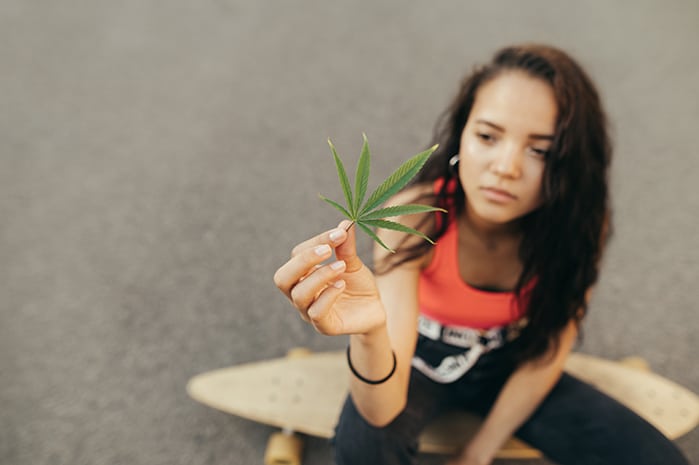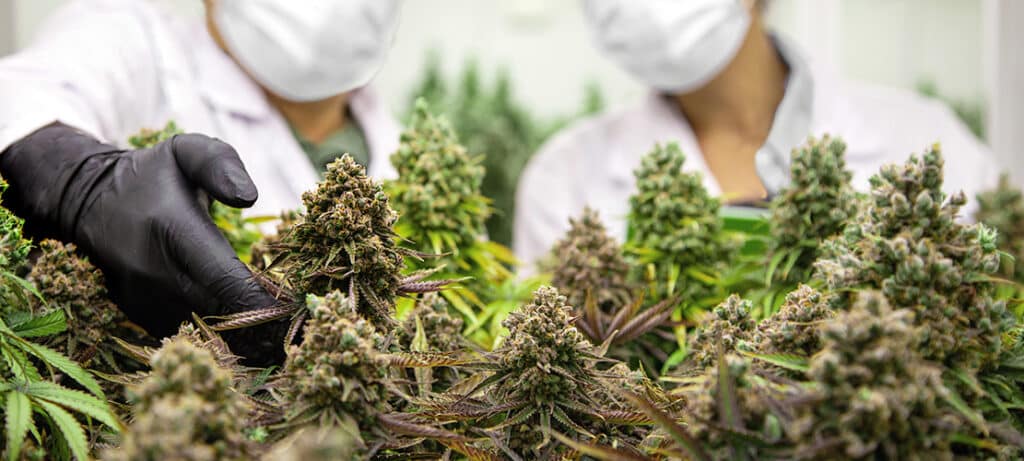Dealing with an adolescent who is struggling with addiction is one of the most painful and anxious processes a parent can experience. The legalization of marijuana has helped normalize its use recreationally, including minors as early as middle school age. Minors are able to easily obtain marijuana in many different forms, making it difficult for parents to limit or filter the amounts, frequency, or places their child will use. One of the main dichotomies parents face is that their child expects them to be supportive of their marijuana use even when it is clear that they are negatively affected. This is because minors view the use of marijuana as harmless, normal, or not a big deal. Minors minimize the effects of marijuana overuse and expect their parents not to make a big deal of their use, even when it has a negative effect.
The focus of this blog is to help parents recognize when the use of Marijuana is negatively impacting their child and what to do. The overuse of any substance is a misuse of it and will negatively impact any person. Overusing marijuana will negatively affect a child’s physical, mental, and social well-being. Here are some signs that your child might be overusing marijuana:

- Increased Tolerance:
Needing more marijuana to achieve the desired effects or experiencing reduced effects from the same amount is a sign of tolerance. This can lead to escalating use over time. - Craving:
Frequent, strong cravings for marijuana, especially when not used, can indicate dependence and overuse. - Neglecting Responsibilities:
If marijuana use starts interfering with important responsibilities like work, school, or family obligations, it’s a sign of overuse. - Social Isolation:
Avoiding social activities, friends, or family gatherings in favor of using marijuana is a red flag. Overuse can lead to withdrawal from social connections. - Loss of Interest:
A significant loss of interest in activities and hobbies you once enjoyed can indicate that marijuana is taking precedence in your life.
- Increased Use in Larger Amounts:
Using marijuana more often or in larger quantities than initially intended is a sign of overuse. - Failed Attempts to Cut Down:
Repeatedly trying and failing to cut down or control marijuana use is a clear indication of a problem. - Withdrawal Symptoms:
Experiencing withdrawal symptoms like irritability, restlessness, mood swings, and sleep disturbances when not using marijuana can suggest physical dependence. - Physical Health Issues:
Chronic marijuana use can lead to physical health problems such as lung, memory, and reduced motivation. Mental Health Changes:
Increased anxiety, paranoia, or depression can result from marijuana overuse. It can exacerbate pre-existing mental health conditions or lead to the development of new ones.Legal and Financial Problems:
Getting into legal trouble due to marijuana use, such as DUIs or possession charges, or facing financial difficulties because of spending excessively on marijuana is concerning.Neglecting Hygiene and Self-Care:
Overuse can lead to neglecting personal hygiene, grooming, and overall self-care.Time Consumption:
Spending a significant amount of time obtaining, using, or recovering from the effects of marijuana is a sign of overuse.Loss of Control:
Feeling unable to control or stop marijuana use despite recognizing its negative consequences is a strong indicator of a problem.

It can be extremely challenging and emotionally taxing to get your child to understand how their overuse of a substance is negatively affecting them. It’s essential to approach this situation with care and seek professional help. Here are some steps and considerations to help you navigate this difficult situation:
Don’t Minimize: Parents should keep track by documenting the changes they see in their child who is using Marijuana. When presenting information to the child, it will be key that it is more than just “I don’t want you to smoke” or “Marijuana is not good for you.” Maximize your documentation of their changes, moods, impulsivity, behaviors, mental health, reduction of engagement, etc.
Educate Yourself: Understand the nature of addiction, its causes, and its effects on physical and mental health. This knowledge will help you comprehend what your adolescent is going through.
Open Communication: Create a safe and non-judgmental environment where your adolescent feels comfortable discussing their struggles. Encourage open and honest conversations about their substance use.
Seek Professional Help: Addiction is a complex issue, and it typically requires the expertise of healthcare professionals. Start by consulting with a doctor, therapist, or addiction specialist who can assess the severity of the problem and recommend appropriate treatment options.
Support and Empathy: Show your adolescent that you care about their well-being. Be empathetic and understanding of their struggles, even if you don’t condone their behavior. Addiction is often a response to underlying emotional pain or trauma.
Set Boundaries: While being supportive, it’s also crucial to set clear boundaries and consequences for their actions. This can help them understand the seriousness of their addiction and its impact on their life.
Encourage Treatment: If a professional recommends treatment, encourage your adolescent to participate in therapy, counseling, or a rehabilitation program. Treatment options may include outpatient counseling, inpatient rehabilitation, or support groups.
Stay Involved: Stay actively involved in your adolescent’s recovery process. Attend therapy sessions or support group meetings together if possible. This shows your commitment to their well-being.
Seek Support for Yourself: Dealing with a loved one’s addiction can be emotionally draining. Consider joining a support group for families of addicts or seeking therapy for yourself to cope with the stress and emotions associated with this situation.
Avoid Enabling: Be cautious not to enable their addiction. Avoid providing money or resources that could be used to support their substance use. This can be difficult, but it’s essential for their long-term recovery.
Be Patient: Recovery from addiction is a long and often challenging journey. Relapses are common, but they don’t necessarily mean failure. Be patient and supportive throughout the process.
Legal Implications: Depending on the situation, there may be legal consequences for your adolescent’s actions related to their addiction. Consult with legal professionals if necessary.
Celebrate Milestones: Acknowledge and celebrate your adolescent’s achievements and milestones in their recovery, no matter how small they may seem. Positive reinforcement can be powerful.
Strong boundaries for someone struggling with addiction are essential for their safety and well-being. These boundaries should be clear, consistent, and aimed at promoting recovery and a healthier lifestyle. Here are some examples of strong boundaries for an addict:
- Zero Tolerance for Drug Use:
Make it clear that drug use of any kind is not allowed, and there will be consequences for any violation of this rule. This means no exceptions, no matter the circumstances. - Limit Contact with Enablers:
Set boundaries regarding the people your loved one associates with. Encourage them to avoid friends or acquaintances who use drugs or enable their addiction. Random Drug Testing:
Implement a system of random drug testing to ensure your loved one remains drug-free. Knowing they could be tested at any time can act as a deterrent.Treatment Adherence:
Require your loved one to actively participate in addiction treatment programs, therapy, or counseling as recommended by professionals. Attendance and engagement should be non-negotiable.Curfew:
Establish a curfew to ensure that your loved one is not out late at night engaging in risky behavior or potentially using drugs.Financial Boundaries:
Limit access to money to prevent it from being spent on drugs. Offer financial support for necessities, but avoid providing funds that could be misused.
Monitoring Online Activity:
Keep an eye on your loved one’s online activities and social media to ensure they are not engaging in drug-related behaviors or associating with users.Regular Check-Ins:
Schedule regular check-ins to discuss progress, challenges, and concerns. This helps maintain open communication and provides an opportunity to address issues promptly.Emergency Plan:
Develop a plan for what to do in case of a relapse or a crisis. Knowing how to respond can prevent the situation from spiraling out of control.Encourage Positive Activities:
Encourage and support your loved one in engaging in healthy, drug-free activities like sports, hobbies, volunteering, or pursuing educational or career goals.Seek Professional Guidance:
Collaborate with addiction specialists, therapists, or counselors to help establish and enforce boundaries effectively. They can provide guidance tailored to your loved one’s specific situation.Self-Care Boundaries:
Don’t forget to establish boundaries for your own well-being. Caring for someone with addiction can be emotionally taxing, so ensure you have time for self-care and support from friends or support groups.
It’s important to note that while setting strong boundaries is crucial, it should be done with empathy and understanding. Addiction is a complex issue, and your loved one may need support and treatment to address the underlying causes of their addiction. Be prepared for resistance and pushback, but stay firm in your commitment to their recovery and safety. Ultimately, the goal of these boundaries is to help your loved one break the cycle of addiction and work toward a healthier, drug-free life. Remember that addiction is a medical condition, and it can affect anyone, regardless of age. Your adolescent needs your love, support, and access to professional help. It’s a difficult journey, but recovery is possible with the right guidance and resources.

Dr. Yaro Garcia
Hello, I am Dr. Garcia, please call me Yaro. My degrees are in clinical psychology and I am a licensed mental health counselor. My approach is caring, warm, safe, non-judgmental, and straight forward. It is a difficult decision to seek therapy, I take time to build a trusting therapeutic relationship with you…
















